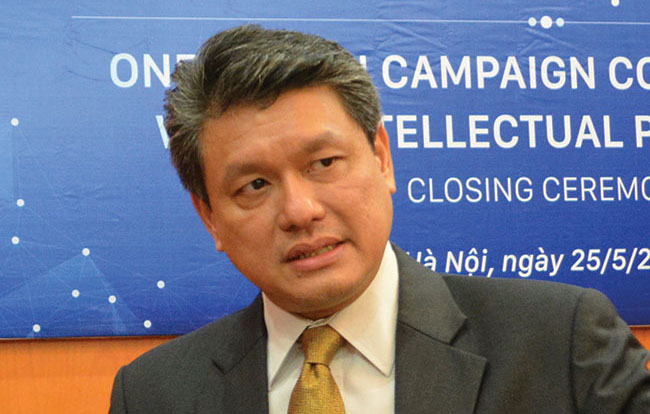Vietnam warned to raise guard against cyber threats
 What is your assessment of the situation regarding intellectual property rights violations in Vietnam?
What is your assessment of the situation regarding intellectual property rights violations in Vietnam?
According to our latest statistics, the personal computer (PC) software piracy rate in Vietnam stood at 81 per cent in 2013, which is quite high when compared to the regional average of 62 per cent in Asia Pacific, and 43 per cent globally. The commercial value of that unlicensed software totalled $620 million. Bringing this rate down will require a strong commitment from both the government as well as the private sector to bring greater awareness of the risks associated with unlicensed software use.
What should Vietnamese enterprises do to protect themselves from cyber security threats?
In a recent study conducted by IDC, results showed that there is a strong correlation between unlicensed software and malware encounters – the higher the unlicensed software rate in a country, the more malware generally encountered on PCs in that country, and vice versa. In statistical terms, the correlation between unlicensed software and malware is even higher than the correlation between smoking and lung cancer, and higher than the correlation between education and income. For Vietnam, this is a sign that warrants serious attention. My first piece of advice is to switch to licensed software.
My second piece of advice is to implement an effective software asset management (SAM) practice and policy in the organisation. Effective software management combines the needs of an organisation’s IT assets with the needs of the company and of the individual. In both traditional and cloud environments, the practice of managing the lifecycle of software assets within an organisation and remaining compliant with software licence agreements is critical.
Without a model SAM practice, the sad reality is that when it comes to cybercrime, we simply cannot protect what we don’t know. When an organisation has a clear understanding of their software estate, the more prepared they are to build a resilient, adaptive IT infrastructure that can respond to these threats.
Last week, in co-ordination with the Software Alliance (BSA), Vietnam’s ministries of Science and Technology (MoST), as well as Culture, Sports and Tourism (MoCST) organised a closing conference for the One Month Campaign for World Intellectual Property Day. Why has BSA been involved in this campaign?
BSA is the leading advocate for the global software industry before governments and in the international marketplace. We believe that intellectual property is a critical driver of technological innovation and economic competitiveness.
We are very pleased to be able to work with the MoST in organising the One Month Campaign through a large number of effective activities. We really appreciate the strong commitment of the MoST and other members of the Vietnam government inter-ministerial intellectual property right (IPR) protection task forces, known as Programme 168, especially the MoCST. This campaign is aimed at raising the awareness of enterprises and individuals about using licensed software. Currently, there is a large number of unlicensed software users in Vietnam. This will lead to a wide range of cyber security threats that can affect their performance, and also badly affect their prestige within the market. That’s why BSA has joined this campaign.
We believe that through a strategy of educational activities combined with strong, effective enforcement measures, Vietnam’s IPR protection will move to a higher level in the coming years, creating a great incentive for Vietnam’s economic development.
What message are you sending out through the campaign?
An important part of our message in this campaign has been about the connection between unlicensed software and cyber security threats. In fact, BSA’s 2014 Global Software Survey found that computer users cite exposure to cyber security threats from malware as the chief reason not to use unlicensed software.
A threshold step to mitigating risk is gaining an understanding of your own network and if the software you are using is genuine and fully licensed. Unfortunately, many businesses are failing to take this basic and critical first step to protect themselves.
What the stars mean:
★ Poor ★ ★ Promising ★★★ Good ★★★★ Very good ★★★★★ Exceptional
Latest News
More News
- State corporations poised to drive 2026 growth (February 03, 2026 | 13:58)
- Why high-tech talent will define Vietnam’s growth (February 02, 2026 | 10:47)
- FMCG resilience amid varying storms (February 02, 2026 | 10:00)
- Customs reforms strengthen business confidence, support trade growth (February 01, 2026 | 08:20)
- Vietnam and US to launch sixth trade negotiation round (January 30, 2026 | 15:19)
- Digital publishing emerges as key growth driver in Vietnam (January 30, 2026 | 10:59)
- EVN signs key contract for Tri An hydropower expansion (January 30, 2026 | 10:57)
- Vietnam to lead trade growth in ASEAN (January 29, 2026 | 15:08)
- Carlsberg Vietnam delivers Lunar New Year support in central region (January 28, 2026 | 17:19)
- TikTok penalised $35,000 in Vietnam for consumer protection violations (January 28, 2026 | 17:15)
















 Mobile Version
Mobile Version